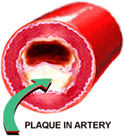 Dietary Cholesterol
Dietary Cholesterol
Cholesterol is a fatty substance that's found in animal-based foods such as meats, poultry, egg yolks, and whole milks. Do you remember the other type of fat that is found in animal-based products? That's right — saturated fat.
So, when you follow the tips to reduce your saturated fat intake, in most cases, you will be reducing your dietary cholesterol intake at the same time. For example, if you switch to low-fat and fat-free dairy products, you will reduce your intake of both saturated fat and cholesterol.
| Quick Q& A |
|---|
| I've heard that some people have high blood cholesterol because of the foods they eat but that other people have high cholesterol because of genetics. What's the difference? |
| Not only do you get cholesterol from the foods you eat (your diet) your body also makes cholesterol to use in normal body functions. The cholesterol made by your body is partly influenced by your genes and these genes are shared by your family members. Even though genetics play a role, families often also share the same eating and lifestyle habits. Some health problems that seem to run in families may be worsened by these unhealthful habits. If you have a genetic tendency to produce more cholesterol, you may still obtain additional benefits from reducing the cholesterol in your diet. |
Cholesterol in Your Blood
You may be reading this section about cholesterol because you have been diagnosed with high blood cholesterol, or you may have been told that your "good" cholesterol is too low, or that your "bad" cholesterol is too high. What does all this mean?
Here are some quick definitions that may help you. You may also want to check out the links below for more detailed information.
Total Cholesterol. This is the total measured cholesterol in your blood. This number includes all other types of cholesterol such as HDL and LDL, as defined below. High blood cholesterol can increase your risk of heart disease.
It is important to know your numbers. You can't tell if the cholesterol in your blood is high by how you feel. You'll need a blood test from your healthcare provider to know. If you don't know what your blood cholesterol level is, talk to your health care provider.
HDL. HDL stands for high-density lipoprotein cholesterol. The HDL cholesterol is often called "good" cholesterol because it helps carry cholesterol away from your body's organs and to your liver where it can be removed. To help you remember, that HDL is the "good" cholesterol, recall that the "H" stands for high and higher HDL cholesterol is good.
LDL. LDL stands low-density lipoprotein cholesterol. The LDL cholesterol is sometimes called "bad" cholesterol because it's the type of cholesterol that is linked with a higher chance of heart disease. Remember that L stands for "low" and you want to keep LDL lower in your blood.
What Is High Blood Cholesterol?
 Too much cholesterol in the blood, or high blood cholesterol, can be serious. People with high blood cholesterol have a greater chance of getting heart disease. Cholesterol can build up on the walls of your arteries (blood vessels that carry blood from the heart to other parts of the body). This buildup of cholesterol is called plaque. Over time, plaque can cause narrowing of the arteries.
Too much cholesterol in the blood, or high blood cholesterol, can be serious. People with high blood cholesterol have a greater chance of getting heart disease. Cholesterol can build up on the walls of your arteries (blood vessels that carry blood from the heart to other parts of the body). This buildup of cholesterol is called plaque. Over time, plaque can cause narrowing of the arteries.
If you've already been diagnosed with high blood cholesterol or want more information about how to prevent it, visit these links from the National Heart, Lung, and Blood Institute for more information.
- High Blood Cholesterol
National Institute of Health (NIH), National Heart, Lung and Blood Institute (NHLBI)
This site explains what high blood cholesterol is, its signs and symptoms, and how it is diagnosed and treated. - High Blood Cholesterol: What You Need to Know(PDF-195k)
NHLBI, National Cholesterol Education Program
This document explains what your cholesterol numbers mean, how to calculate your heart disease risk, and how to treat high levels of cholesterol using the Therapeutic Lifestyle Changes (TLC) diet.
Please note that these Web sites are intended for adults who have been diagnosed with high cholesterol. For information about cholesterol and children, please visit the American Heart Association's Cholesterol and Atherosclerosis in Children.*
More Information on Fats
Contact Us:
- Centers for Disease Control and Prevention
1600 Clifton Rd
Atlanta, GA 30333 - 800-CDC-INFO
(800-232-4636)
TTY: (888) 232-6348 - cdcinfo@cdc.gov


